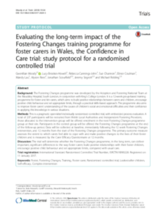Abstract
Background
The Fostering Changes programme was developed by the Adoption and Fostering National Team at the Maudsley Hospital, South London, in conjunction with King’s College London. It is a 12-week group-based training programme for foster and kin carers, which aims to build positive relationships between carers and children, encourage positive child behaviour and set appropriate limits, through a practical skills-based approach. The programme also aims to improve foster carers’ understanding of the causes of children’s social and emotional difficulties and their confidence in applying this knowledge in various situations.
Methods
This is a pragmatic open-label individually randomised controlled trial, with embedded process evaluation. A total of 237 participants will be recruited from Welsh Local Authorities and Independent Fostering Providers; those allocated to the intervention group will be offered enrolment in the next Fostering Changes programme group at their site. Participants in the control group will be offered the Fostering Changes programme at the end of the follow-up period. Data will be collected at baseline, immediately following the 12 week Fostering Changes intervention, and 12 months from the start of the Fostering Changes programme. The primary outcome measure assesses the extent to which carers feel able to cope with and make positive changes to the lives of their foster children and is measured by the Carer Efficacy Questionnaire at 12 months.
Discussion
The trial will determine whether the Fostering Changes programme, in the long term, can deliver important, significant differences to the way foster carers build positive relationships with their foster children, encourage positive child behaviour and set appropriate limits, compared with usual care.

